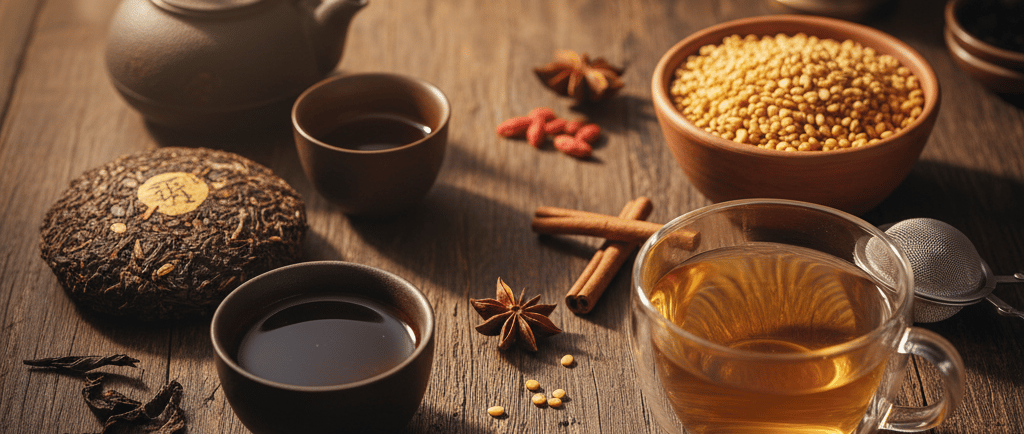An Elixir of Two Worlds: The Ancient Tale of Pu-erh and Fenugreek Tea
This article explores Pu-erh and Fenugreek teas, highlighting their origins, shared digestive benefits, and distinct roles in metabolic and hormonal health.
PU ERH TEAART OF DRINKINGCEREMONIESCHINESE CEREMONIESTEAANTIOXIDANTHEALTH BENEFITARTCULTURETEA LOVERSCHINAGUT HEALTHCHINESE TRADITIONDIGESTIVEHEALTHPROBIOTICART OF TEAFENUGREEK TEA


Amidst the mists of ancient lands, two revered elixirs, Pu-erh and Fenugreek tea, emerge from the annals of history, each with its unique story and a bounty of health-giving properties. Though they originate from different corners of the world and serve distinct purposes, their shared essence lies in their profound connection to wellness.
Origins and Heritage
Pu-erh, a tea of profound complexity, is born in the verdant, mist-shrouded mountains of Yunnan province, China. Named after the ancient trading town of Pu'er, this tea is a living legend, its very essence shaped by time and microbial fermentation. It was a vital commodity on the legendary Tea Horse Road, where its compressed cakes were a form of currency, their value increasing with age. The Chinese tradition honors Pu-erh as "black tea" (hēi chā), a distinct category from the "red tea" (hóng chá) known as black tea in the West. This unique fermentation process, which can take years or even decades, imbues the tea with its characteristic earthy flavor and a treasure trove of beneficial compounds.
In contrast, Fenugreek, a golden seed of antiquity, finds its roots in the Mediterranean region, southern Europe, and western Asia. Its history is etched in the scrolls of ancient civilizations, from the tombs of Egyptian pharaohs to the remedies of Ayurvedic and traditional Chinese medicine. Known for its distinct, maple-like aroma, Fenugreek has been cherished for millennia not as a tea leaf, but as a spice and a healing herb. The preparation of its tea, a simple infusion of its seeds, has long been a folk remedy for a myriad of ailments, a testament to its enduring power.
Harmonious Similarities
Though their origins are oceans apart, Pu-erh and Fenugreek share a common purpose: to nurture the body. Both are revered for their digestive benefits. Pu-erh, with its fermented nature, is a friend to the gut, aiding in the breakdown of fats and easing discomfort after a heavy meal. It is a cleansing elixir that supports the gut microbiome. Similarly, Fenugreek has been used for centuries to soothe digestive woes, from bloating to constipation, thanks to its rich fiber content.
Both also play a role in metabolic health. Pu-erh is often lauded for its ability to help manage weight by potentially aiding in fat metabolism and reducing cholesterol levels. Fenugreek, too, is celebrated for its potential to help regulate blood sugar, a key component of metabolic well-being. This shared benefit makes both teas a gentle addition to a health-conscious diet.
Distinctions in Health's Garden
Despite their common ground, the true beauty of these two teas lies in their distinct applications, each a unique path to wellness.
* Pu-erh's domain is the heart and mind. It contains a gentle dose of caffeine, providing a focused energy boost without the jitters often associated with coffee. This makes it a perfect companion for moments of quiet contemplation or a demanding work day. Furthermore, some studies suggest that Pu-erh contains lovastatin, a compound also found in certain cholesterol-lowering drugs, which may contribute to its heart-protective effects. Its power lies in its fermented vitality, a living energy that aids in blood circulation and overall well-being.
* Fenugreek's realm is hormonal balance and nourishment. This golden seed is a powerful ally for women, known for its ability to stimulate milk production in breastfeeding mothers due to its phytoestrogen content. It is also used to ease menstrual discomfort and menopausal symptoms. Unlike Pu-erh, Fenugreek tea is caffeine-free, making it a soothing choice for any time of day, particularly for those sensitive to stimulants. Its benefits extend to the kidneys and reproductive system, reflecting its long history in traditional medicine as a warming, restorative tonic.
In the grand tapestry of herbal wisdom, Pu-erh tea is the aged scholar, offering profound and nuanced support to the digestive and circulatory systems. Fenugreek is the compassionate healer, a source of comfort and balance, particularly for the female body. To choose between them is not to diminish one, but to honor the distinct path each offers on the journey to a harmonious life.
